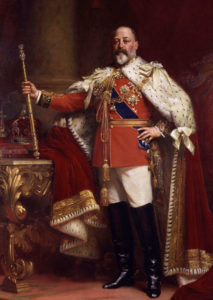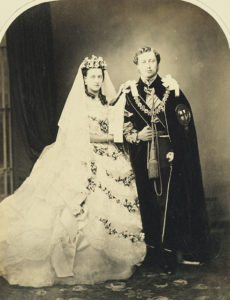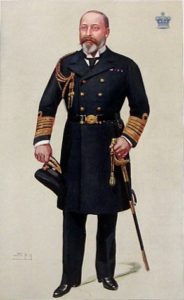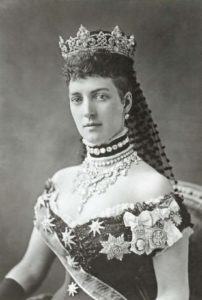by Catharine Arnold
Many of Edward VII’s friendships much distressed the Queen, who was equally disturbed by the Prince’s intimacy with such fast women as Lady Filmer and the Duchess of Manchester, a witty, beautiful Germanborn woman who enjoyed the attention of numerous distinguished admirers while her husband was alive and, when he was dead, married the most ardent and constant of her lovers, the Duke of Devonshire. The Queen did all she could to prevent her son and daughter-in-law entertaining, or being entertained by, these people and others like them.
The Duchess of Manchester ‘is not a fit companion for you’, she warned Princess Alexandra. The Duchess of Sutherland was ‘a foolish, injudicious little woman’ whose husband did ‘not live as a Duke ought’. Yet the Prince—making excuses for the Duchess of Manchester and protesting that, ‘despite certain eccentricities and, formerly, faults’, the Duke of Sutherland was ‘a clever and most straightforward man’— continued to ask them both to Marlborough House and Sandringham and to accept invitations to Kimbolton, to Trentham and to Stafford House, the Sutherlands’ London house, where, at a masked ball, he much amused Disraeli by walking up to the Duchess and addressing her, ‘How do you do, Mrs Sankey? How is Mr Moody?

Nor could the Queen dampen her son’s whole-hearted enthusiasms for the club life of London. Edward VII’s membership of White’s and the Turf Club was not entirely exceptionable; his recurrent visits to the Cosmopolitan Club might be excused on the grounds that he met many of the distinguished foreign visitors who were so often entertained there. But his patronage of the Garrick Club and, even worse, of the Savage Club was, the Queen considered, scarcely compatible with his position.
‘Bertie is not improved since I last saw him,’ the Queen complained to the Crown Princess a fortnight after he had moved into Marlborough House, ‘and his ways and manners are very unpleasant. Poor dear Alix! I feel so for her.’ A few weeks later she renewed her strictures:
Bertie and Alix left Frogmore today, both looking as ill as possible. We are all seriously alarmed about her. For although Bertie says he is so anxious to take care of her, he goes on going out every night till she will become a Skeleton … Oh, how different poor foolish Bertie is to adored Papa, whose gentle, loving, wise motherly care of me, when he was not twenty-one, exceeded everything!
What on earth, wondered the Queen, would become of the poor country when she died? She foresaw, if Bertie succeeded, ‘nothing but misery, and he would do anything he was asked and spend his life in one whirl of amusements’, as he did now. It made her ‘very sad and anxious’.
He and the Princess really ‘should not go out to dinners and parties’ so much during the London season, she told Lord Granville. They ought to restrict themselves to occasional evening visits to senior members of the Cabinet such as the Prime Minister, the Lord President of the Council and ‘possibly Lord Derby’, and to such respectable houses as Apsley House, Grosvenor House and Spencer House, but ‘not to all these the same year’.
She said as much to Edward VII himself in a letter to General Knollys which she asked to be brought to her son’s attention. Society had become ‘so lax and so bad’ that the Prince and Princess of Wales had a duty to deny themselves amusement in order to keep up ‘that tone … which used to be the pride of England’. They must show their disapproval of its looser members by ‘not asking them to dinner, nor down to Sandringham—and, above all, not going to their houses’.

To associate the Crown with such frivolous and worthless people was both disgraceful and dangerous, for not only was ‘every sort of vice’ tolerated in the aristocracy ‘whereas the poorer and working classes, who [had] far less education and [were] much more exposed, [were] abused for the tenth part less evil than their betters commit without the slightest blame’, but also ‘in the twinkling of an eye, the highest may find themselves at the feet of the poorest and lowest’.
Edward VII, too, was concerned about this and—worried, also, by the bomb outrages committed by Irish revolutionaries in England—he wrote to the Queen to advise her to urge the government to ‘use the high hand, be firm and deal with these rebels’ most summarily. ‘If they do not,’ he went on, ‘the lower classes who already have a much greater power than they, I think, have any idea of, will be very difficult to manage; and then it will cause bloodshed.’
The Queen, however, saw the danger in a different light: the rebels were just a few ruffians; the country as a whole ‘never was so loyal or so devoted to their Sovereign as now’. But there certainly was a danger, a ‘great danger’, and one which it was the duty of all to try to avert. As the Queen informed her son:
This danger lies not in the power given to the lower orders, who are daily becoming more well-informed and more intelligent, and who will deservedly work themselves up to the top by their own merits, labour and good conduct, but in the conduct of the Higher Classes and of the Aristocracy.
Many, many with whom I have conversed, tell me that at no time for the last sixty or seventy years was frivolity, the love of pleasure, self-indulgence, and idleness (producing ignorance) carried to such excess as now in the Higher Classes, and that it resembles the time before the first French Revolution; and I must—alas!—admit that this is true. Believe me! It is most alarming, although you do not observe it, nor will you hear it; but those who do not live in the gay circle of fashion, and who view it calmly, are greatly, seriously alarmed. And in THIS lies the REAL danger.

Edward VII took leave to disagree. He granted the truth of what his mother said about the ‘really hardworking labouring classes’; but there were many ‘toughs’ outside these classes, and they were getting ‘a greater power … to a much greater extent than people [were] aware of’. As for the aristocracy, he thought it ‘hard to say that all’ were as given over to ‘amusement and self indulgence’ as she had suggested. He continued:
In every country a great proportion of the aristocracy will be idle and fond of amusement, and have always been so; but I think that in no country more than ours do the Higher Classes occupy themselves, which is certainly not the case in other countries. We have always been an Aristocratic Country, and I hope we shall always remain so, as they are the mainstay of this Country, unless we become so Americanized that they are swept away.
Although he insisted that in no country did the higher classes occupy themselves more than they did in England, Edward VII himself found very little useful work to do. When the Prince Consort was alive the Queen had dreaded the thought that her son might usurp the place which she considered her husband ought to fill; and the government had had to appeal to Stockmar to dissuade her from insisting that a bill should be introduced into Parliament giving Prince Albert legal precedence over the Prince of Wales.
After her husband’s death she was even more determined to exclude her son from any position of authority. She reluctantly admitted on occasions that he ought to become ‘more and more acquainted with affairs and the way in which they [were] conducted’; yet she shrank from actually bringing him closer to matters which she wanted to deal with entirely by herself. ‘No human power,’ she assured her uncle, King Leopold, ‘will make me swerve from what he decided and wished … I apply this particularly as regards our children—Bertie, etc.—for whose future he had traced everything so carefully. I am also determined that no one person, may he be ever so good, ever so devoted … is to lead or guide or dictate to me.’ As she recorded in her diary, she could ‘hardly bear the thought of anyone helping [her] or standing where [her] dearest had always stood’.
As the months went by the Queen continued to remark from time to time that the Prince ought to ‘prepare himself more and more for that position’ which she could not help thinking he might not be as far removed from ‘as many wished to think’. But at the same time she continued to rebuff all attempts to gain for the Prince that experience which she agreed to be essential, preferring to call upon the younger children, especially the rather sickly Prince Leopold, when she needed any help with her paper work, and treating with scorn any suggestion that, in view of the seclusion in which she had chosen to live since the first day of her widowhood, she might consider abdicating in favour of her eldest son. When Lord Clarendon was heard to remark that even the Prince Consort would have found for his son, now that he was of age, some sort of regular work which would keep him out of harm’s way, the Queen let it be known that she was much offended. As Prince Arthur’s tutor, Major Elphinstone, observed, ‘I fear the Queen is not disposed to let him interfere in public.’

She categorically informed Lord Granville that Edward VII should ‘upon no account be put at the head of any of those Societies or Commissions, or preside at any of those scientific proceedings in which his beloved Father took so prominent a part’. And when the Prince was offered the post of President of the Society of Arts, she vetoed the proposal on the grounds that he was too young and inexperienced. Nor would she hear of his being allowed to represent her in public. She was ‘very much opposed’ to the system of putting the Prince of Wales forward as the representative of the sovereign. She told the Home Secretary:
Properly speaking, no one can represent the Sovereign but Her, or Her Consort. There are certain duties and forms which … as the Queen is unable to perform them she can and does depute someone else to perform … but her Majesty thinks it would be most undesirable to constitute the Heir to the Crown a general representative of Herself, and particularly to bring Him forward too frequently before the people. This would necessarily place the Prince of Wales in a position of competing as it were, for popularity with the Queen. Nothing … should be more carefully avoided.
On the grounds that he was not as discreet as he ought to have been, the Queen also refused to allow the Prince to receive copies of the Foreign Office dispatches which were sent to her and to members of the Cabinet. He must be content with ‘a précis made of such dispatches’ as she thought it proper for the Prince to see. He protested; and the Foreign Secretary, Lord Russell, supported his protest; but the Queen was adamant, and the Prince had to glean what information he could from unofficial correspondence, newspapers and conversations with ministers and diplomats.
Year after year passed; the position was still the same; and Edward VII felt obliged to complain to his mother that he was less trusted with official information than were the private secretaries of government ministers. He was not even allowed to know what went on in the Cabinet, and was driven to writing rather apologetic letters to friendly ministers for any information they might feel able to give him. ‘Would you consider it very indiscreet if I asked you to let me know what steps the government are going to take since the meeting of the Cabinet,’ he wrote in one characteristic letter dated 12 March 1873 to his friend Lord Hartington, at that time Chief Secretary for Ireland in Gladstone’s Cabinet.
The Prime Minister was sympathetic and asked the Queen if he might be allowed to know ‘anything of importance’ that took place in the Cabinet. But no, the Queen decided, he was no less imprudent in his conversation than he had ever been. It would be ‘quite irregular and improper’ for him to have copies of Cabinet reports, which were, by precedent, for her eyes alone. The Queen’s determination not to let the Prince have access to confidential papers had been reinforced at the outset of the dispute by his attitude towards the invasion of Denmark by German armies intent on wresting from King Christian IX the Duchies of Schleswig and Holstein.
Edward VII’s sympathies were naturally with his father-in-law and he made no secret of them. They were shared by the British people. But the Queen warmly, not to say heatedly, supported the claims of Duke Frederick of Schleswig-Holstein-Sonderburg-Augustenburg; and she strongly criticized her son for his outspoken comments, his refusal to recognize that there were faults on both sides, his unconcealed championship of the Danes and his denigration of the government’s refusal to help them. ‘This horrible war will be a stain forever on Prussian history,’ the Prince wrote to Mrs Bruce after listening very attentively, ‘with his hat on all the while’, to a declaration of the government’s neutrality in the House of Lords, ‘and I think it is very wrong of our government not to have interfered before now.
As to Lord Russell’s everlasting Notes, nobody cares two-pence about them on the Continent, and the Foreign Ministers to whom they are addressed probably only light their cigars with them.’ The British would have ‘cut a much better figure in Europe’ if instead of sending notes, they had sent their 78 Edward VII fleet to the Baltic; and then ‘all this bloodshed might possibly have been avoided’.
‘This dreadful war in Denmark causes both the Princess and myself great anxiety,’ he told Lord Spencer, ‘and the conduct of the Prussians and the Austrians is really quite scandalous.’ Such remarks were not only addressed to his friends. The Prussian Ambassador, the disagreeable Count Bernstorff, one of the very few foreign diplomats in London whom the Prince did not like, felt constrained to register a formal complaint about Edward VII’s behaviour, which was matched by that of the Princess, who pointedly refused to speak to Bernstorff after she had observed him declining to raise his glass in a toast to the King of Denmark. Even the French Ambassador, Prince de la Tour d’Auvergne, whom the Prince did like, disapprovingly reported to Paris that he had been taxed by him at Marlborough House and bluntly asked in a most undiplomatic manner whether or not there was any truth in the reports that the Emperor Napoleon intended to try to bring about a settlement not entirely in Denmark’s favour.
But Edward VII refused to be silenced. Nothing that either the Queen or the King of the Belgians could do prevented him from speaking his mind. So strongly did he feel, in fact, that he even discussed what he considered to be the pusillanimous policies of the government with leading members of the opposition after his offer to act as an intermediary between London and Copenhagen had been treated—as the Queen instructed that it should be treated—‘with extreme caution’.
CATHARINE ARNOLD read English at Girton College, Cambridge and holds a further degree in psychology. A journalist, academic, and popular historian, her previous books include The Sexual History of London, Necropolis, and Bedlam.

